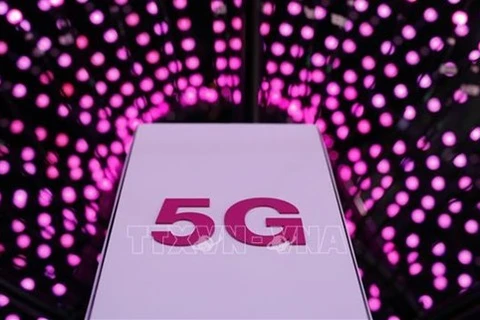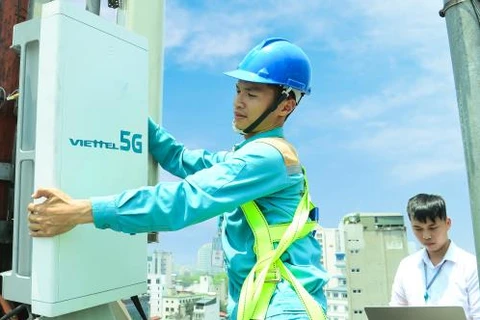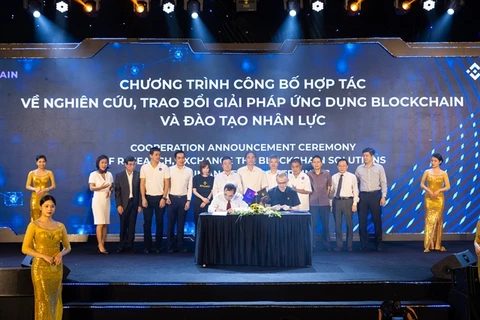Hanoi (VNA) – Cloud computing services, artificial intelligence (AI), the Internet of Things (IoT), 5G technology, fixed broadband internet, and blockchain technology are expected to lead the information technology and telecommunications sector in the time ahead, according to a recent survey.
The survey, conducted by the Vietnam Report JSC, revealed that technology companies are investing in core and fundamental technologies to serve digital transformation.
Cloud computing services in Vietnam are forecast to develop with better security than physical servers, helping organisations and businesses increase productivity and save machinery and infrastructure expenses.
The country’s cloud computing market is predicted to grow by some 26% annually, the fastest pace in Southeast Asia and much higher than the global average of 16%.
Meanwhile, about 66.67% of enterprises are applying AI to their digital transformation process. Capable of managing and optimising infrastructure and customer support, AI is expected to access all businesses in the future.
The survey also found that the rate of firms using the IoT this year has reached 86.67%, an increase from 66.67% in 2021.
IT experts said this is one of the technologies with great development potential at present. By connecting IoT devices from afar, collecting and managing their data, processing data on demand, and sharing data with devices outside the IoT network, the IoT will help automate processes, minimise labour and infrastructure costs, manage supply chains, optimise energy use, and improve sustainability.
The 5G technology is also believed to be part of the IT and telecommunications sector’s future. Its contribution to Vietnam’s GDP will reach 7.34% by 2025 as projected by the Institute of Information and Communications Strategy under the Ministry of Information and Communications (MIC).
The application of 5G services will help telecoms enterprises boost the use of AI and IoT in smart city building and business operations, and meet digital users’ demand for high-definition videos, virtual reality and augmented reality.
According to the MIC’s Authority of Telecommunications, telecoms network infrastructure has been expanded to 100% of communal-level localities. The 2G, 3G and 4G mobile networks have covered 99.8% of the population while 5G has been piloted in 16 provinces and cities.
By the end of 2021, there were nearly 71 million mobile broadband subscribers and 18.8 million fixed ones, respectively rising 4% and 14.6% from 2020. Internet traffic in Vietnam also surged by over 40% last year.
The development of broadband networks is said to have created new spaces for businesses in the post-pandemic recovery period, especially opportunities for telecoms service suppliers to fuel growth in the future.
Regarding blockchain, this is a technology enabling safe transmission of data on the basis of a complicated data encoding system. It has developed beyond the financial and monetary sector to enter many different social aspects. Thanks to its development potential, blockchain is opening up chances for the technology - telecommunications industry, according to the report./.
The survey, conducted by the Vietnam Report JSC, revealed that technology companies are investing in core and fundamental technologies to serve digital transformation.
Cloud computing services in Vietnam are forecast to develop with better security than physical servers, helping organisations and businesses increase productivity and save machinery and infrastructure expenses.
The country’s cloud computing market is predicted to grow by some 26% annually, the fastest pace in Southeast Asia and much higher than the global average of 16%.
Meanwhile, about 66.67% of enterprises are applying AI to their digital transformation process. Capable of managing and optimising infrastructure and customer support, AI is expected to access all businesses in the future.
The survey also found that the rate of firms using the IoT this year has reached 86.67%, an increase from 66.67% in 2021.
IT experts said this is one of the technologies with great development potential at present. By connecting IoT devices from afar, collecting and managing their data, processing data on demand, and sharing data with devices outside the IoT network, the IoT will help automate processes, minimise labour and infrastructure costs, manage supply chains, optimise energy use, and improve sustainability.
The 5G technology is also believed to be part of the IT and telecommunications sector’s future. Its contribution to Vietnam’s GDP will reach 7.34% by 2025 as projected by the Institute of Information and Communications Strategy under the Ministry of Information and Communications (MIC).
The application of 5G services will help telecoms enterprises boost the use of AI and IoT in smart city building and business operations, and meet digital users’ demand for high-definition videos, virtual reality and augmented reality.
According to the MIC’s Authority of Telecommunications, telecoms network infrastructure has been expanded to 100% of communal-level localities. The 2G, 3G and 4G mobile networks have covered 99.8% of the population while 5G has been piloted in 16 provinces and cities.
By the end of 2021, there were nearly 71 million mobile broadband subscribers and 18.8 million fixed ones, respectively rising 4% and 14.6% from 2020. Internet traffic in Vietnam also surged by over 40% last year.
The development of broadband networks is said to have created new spaces for businesses in the post-pandemic recovery period, especially opportunities for telecoms service suppliers to fuel growth in the future.
Regarding blockchain, this is a technology enabling safe transmission of data on the basis of a complicated data encoding system. It has developed beyond the financial and monetary sector to enter many different social aspects. Thanks to its development potential, blockchain is opening up chances for the technology - telecommunications industry, according to the report./.
VNA
























